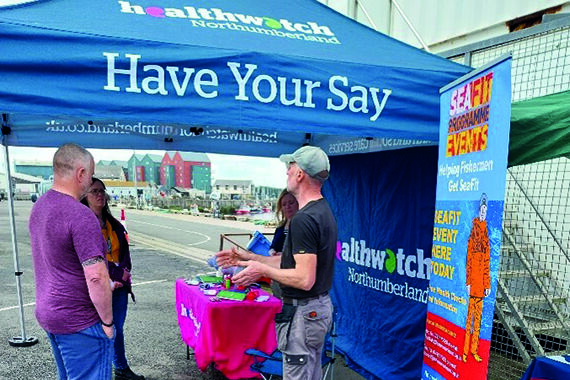How this PCN… is helping fishermen offshore

This site is intended for health professionals only

An outreach pilot in Northumberland is offering GP appointments to fishermen who are often offshore when practices are open. Karen Wood, health inequalities lead for Well Up North PCN, explains
We have quite a lot of fishermen in our area. Well Up North PCN consists of nine practices stretching up along the coast north of Newcastle upon Tyne. Our PCN serves 77,477 patients, of whom we estimate around 80 are fishermen.
Being out at sea, often for stretches lasting several days, is much more of a lifestyle than a job. They’re unpredictable too, depending on the weather. All this restricts fishermen’s access to GP appointments. If they need an urgent same-day appointment, they might only be available when our surgeries are closed. Or if they book an appointment in advance, they might not be able to attend because of the weather.
Of course that means it’s much harder to spot potential problems early on. And if they need to see one of our nurses to manage a long-term condition and they are ringing up on the day, the appointments aren’t there.
We realised we needed to bring our services to the waterfront.
Methods
We relied on our practice to identify that this was an issue. We started by looking at the health inequalities in our patches: who can we see isn’t coming in very much? It became very clear to us that we had a group of fishermen who were ringing up on the day and struggling to get seen.
We launched the pilot service for fishermen in January, based at Amble harbour building in Morpeth. It takes place on a Wednesday every eight weeks. Funding for the pilot comes from the health inequalities investment and impact fund (IIF).
Our target is to offer between eight and 10 appointments across the day. We know they will cover a wide range of health concerns, so we send a variety of staff – our first-contact physiotherapist, a GP, a nurse and a social link worker.
Our health inequalities care co-ordinator Karen Gibson spent time on the harbour, talking to the people we were trying to reach. We spoke with the harbourmaster to determine how our plans would be received, and if they aligned with the needs of those who work in the harbour.
We became aware of two common issues for this patient group – excessive alcohol intake and mental health problems. Also, the job can be isolating and loneliness is a problem for a lot of these people, so we included a mental health practitioner.
Outcomes and challenges
We’re engaging with patients who haven’t been coming into the surgery so the benefits are clear: we’re picking up things that might have been missed. Monitoring of long-term conditions, especially cancer, is much better. We’ve been able to raise awareness of the symptoms of prostate cancer, which might affect a lot of people in this job. The health promotion aspect is another benefit.
In the launch session, 14 patients were seen. In the second session, eight came along. In the third, no one turned up and in the fourth, most recent, session we saw seven.
If we want the service to remain feasible we need more people to attend, particularly as we’re sending staff out of practice for an extended period.
There are things we are doing to encourage that engagement, but a big factor is the unpredictability of the weather and the lifestyle that makes it hard for these patients to come in for health appointments. If the weather is terrible and they’ve had to come back to shore then we are there waiting for them. But if not, it isn’t feasible to keep our staff down there.
But one of the important things we are doing is engaging with the families of the fishermen who are registered with us. Perhaps if a fisherman isn’t too concerned about taking the time to come into
a clinic, they might do so with a push from their partner. Then they know where we are and when.
If we are able to extend the programme beyond its pilot, we’ll look at using extended hours to offer later evening appointments that suit their needs better.
Karen Wood is an advanced nurse practitioner and health inequalities lead for Well Up North PCN and an executive director for the PCN

Register today to receive weekly newsletters and a free copy of Pulse PCN with Pulse magazine
Sign up now